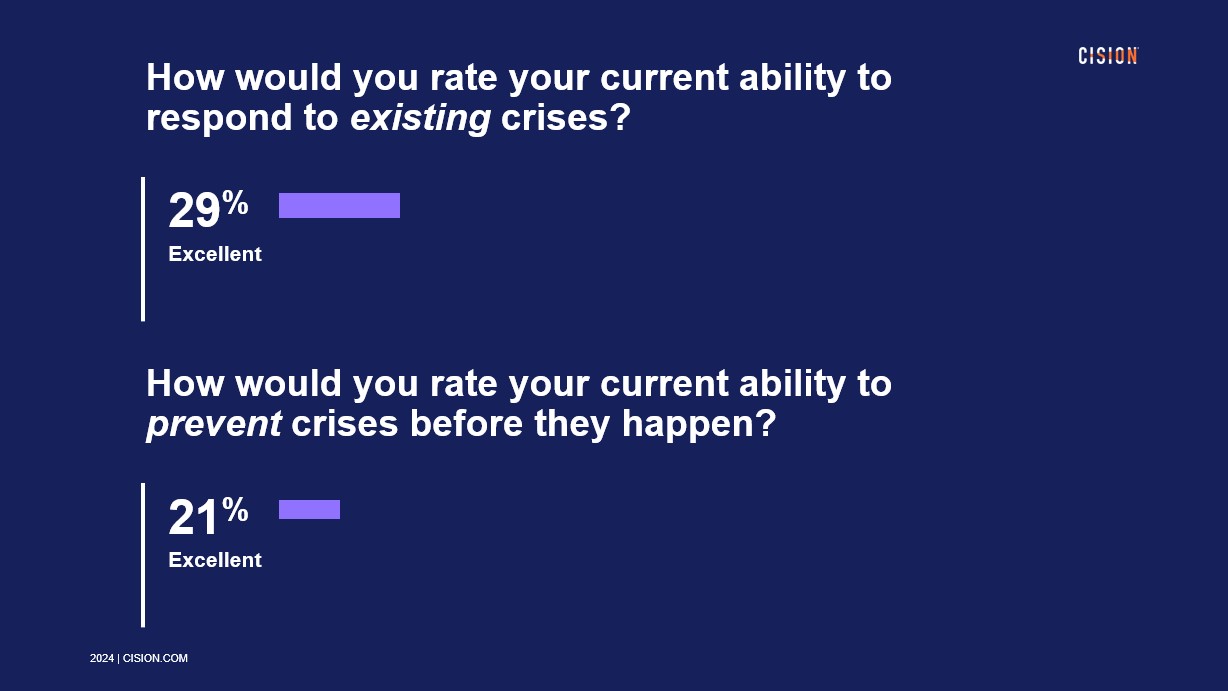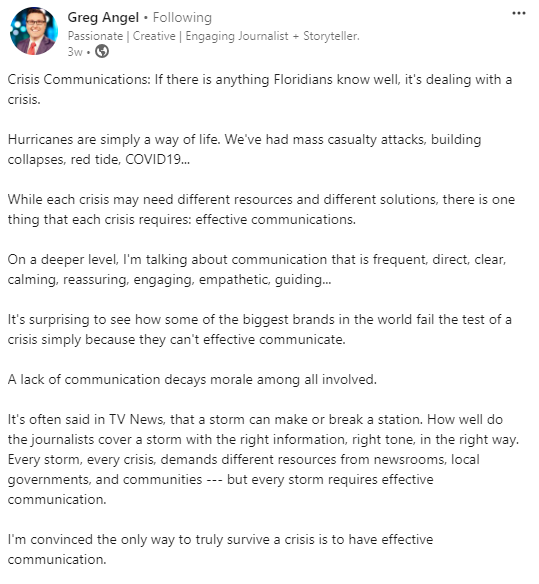We’ve all seen it. A public relations crisis can happen anytime, anywhere - and sometimes from the most unexpected sources.
As a PR professional, you’re typically in the hot seat when it comes to crisis communication. You might not have started the fire, but your leadership team is relying on you to put out the flames. How, when, where, and what your organization communicates is crucial to how your brand will fare in a crisis.
Since public relations teams play such a pivotal role, let’s look at the fundamentals of crisis communication and strategies to prepare for and manage crises, should they arise.
What is Crisis Communication?
In the context of public relations, a crisis is any situation that poses a serious risk to your organization’s reputation or operations. This could be anything from environmental disasters to financial scandals, data breaches, product recalls, or negative media coverage.
Public relations teams often identify emerging crises for an organization as part of their reputation management activities – or are called in if trouble is brewing. Their role is centered around crisis communications - the strategic management of information and messaging during a crisis. The goal is to protect brand reputation, maintain trust, and ensure that accurate information reaches stakeholders promptly.
Although PR teams may be consulted and certainly have a role to play, they are usually not responsible for the full spectrum of activities related to crisis management, which is the overall coordination of an organization’s response.
Why is Crisis Communication Important?
Although the majority (77%) of PR and communications teams have the tools they need, most still struggle to manage crises – or prevent them in the first place (2024 Global Comms Report).

For any brand - big or small - the odds of experiencing some sort of crisis are high. And there are very real consequences. Crises can impact:
- Brand reputation
- Stock prices (for public companies)
- Customer loyalty and attrition
- Sales and revenue
- Employee satisfaction and turnover
Effective crisis communication can make the difference between a quick recovery and long-lasting damage to your brand.

Is It Actually a Crisis?
Not every bump in the road is a full-blown crisis. There are ups and downs for any organization, and sometimes, drawing attention to an issue can make it worse.
Before launching into full-scale crisis comms, it’s important to pause and ask yourself:
- Does this truly threaten our reputation or operations?
- Will public attention escalate the situation unnecessarily?
- Can we handle this internally without involving external stakeholders?
Be strategic about what you elevate to crisis level. Sometimes quiet, internal problem solving is the best approach.
Principles of Effective Crisis Communication
While each crisis is unique, some key principles apply across the board:
Move Quickly
Quick responses can prevent misinformation from spreading and help you control the narrative. Be prepared to issue initial statements acknowledging that you are aware of the issue and what you’re doing to resolve it. Even though the clock is ticking, be sure you have alignment from the critical stakeholders before issuing these statements. To avoid some of the inevitable chasing to lock-in necessary approvals, consider developing a predetermined sign-off policy that can streamline this process in crisis scenarios.
Communicate with Transparency and Honesty
Openness builds trust. Trying to hide or downplay issues often backfires, leading to speculation, misinformation, and further damaging the organization’s reputation. Be forthright about the situation with clear, straightforward communication, even if it means acknowledging mistakes.
Be Consistent
All your communication channels should deliver the same core message. Mixed signals create confusion and erode trust. PR teams should establish key messages and make sure that everyone involved in the communication process is aligned.
Provide Real-Time Updates
Keep both external audiences and internal teams in the loop with the latest information. This reduces confusion and ensures everyone has accurate and up-to-date information. If appropriate, set up a webpage or location to reference as a single source of truth.
Show Authentic Empathy
It’s crucial to show you genuinely care about those affected by the situation. Acknowledge concerns directly and focus your messaging on addressing stakeholder needs. Speak confidently, but don't lose the human touch.
Prepare, Prepare, Prepare: Build Your Crisis Communication Strategy
Preparation is one of the most important factors in how your brand will weather a storm.
Key Components of an Effective Crisis Communication Strategy
- Identify Your Crisis Comms Team: Identify key players and points of contact in your organization who will be part of the crisis communications response.
- Identify Risks: Conduct a risk assessment to pinpoint potential crises that could affect your organization. This proactive approach allows you to prepare tailored responses in advance.
- Establish Communication Channels: Determine how you'll communicate during a crisis, including social media platforms, your company website or press room, press releases, customer emails, internal communication channels (email, Slack, Teams, Sharepoint, etc.), and traditional media outlets. (Note: Both traditional and digital media play crucial roles in crisis communications. Press releases and media outreach help disseminate information to a broader audience, while social media provides real-time updates and allows for direct engagement with stakeholders.)
- Craft Key Messages: Develop a set of core messages that align with your brand values and can be adapted to various crisis scenarios.
- Train Your Spokespeople: Equip your designated spokespersons with media training and crisis simulation exercises to ensure they're prepared to face the public and press.
- Create a Crisis Communication Toolkit: Compile essential resources such as contact lists, message templates, social media guidelines, fact sheets, and FAQs. Revisit this regularly to update as needed so it stays fresh and timely.
For more on proactively preparing for a crisis, check out our Crisis Comms Checklist.
The Crisis Communications Process: Before, During, and After
Crisis communication typically falls into three phases:
Pre-Crisis Phase
This is where preparation is the focus:
- Developing your crisis communication plan
- Conducting regular risk assessments
- Training your team
- Building relationships with stakeholders and media
During the Crisis
When a crisis hits, it's time to put your plan into action:
- Activate your crisis communication team
- Gather and verify information quickly
- Issue initial statements
- Keep stakeholders informed with regular updates
- Monitor media and social platforms closely
- Adjust your strategy as the situation evolves
Post-Crisis Phase
Once the immediate threat has passed:
- Evaluate your response
- Gather feedback from stakeholders
- Update your crisis communication plan
- Implement lessons learned
- Continue monitoring for any lingering issues
Keep Calm and Carry On
Crisis communication skills are critical for every PR practitioner. Crisis communication is about more than just damage control. When handled effectively, a crisis is an opportunity to demonstrate your organization's values, build trust, and even strengthen relationships with stakeholders.
For a detailed breakdown of crisis management, download the Step-By-Step Guide to Managing a PR Crisis.
Find out how CisionOne can not only inform your crisis comms strategy, but also spot potential issues before they escalate so you can take action.








